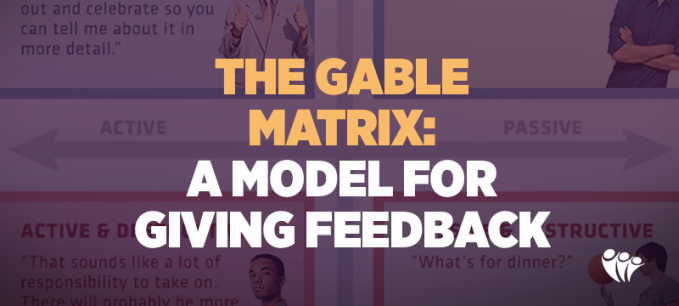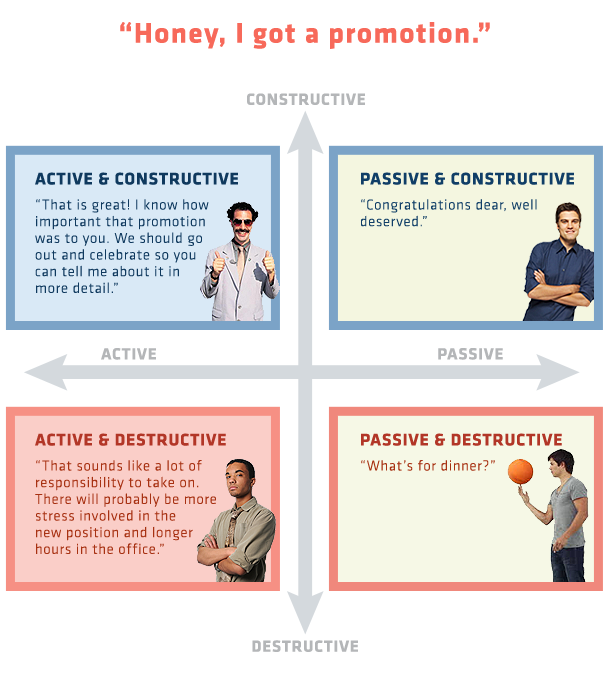The Gable Matrix: A Model for Giving Feedback

Social psychology research has always been fascinated with marriage. Gottman's "magic ratio," for instance, received media attention from around the world for claiming to predict, with 90% accuracy, which newlywed couples would remain married and which would divorce 4-6 years later.
It makes sense to want to know why things go wrong in a relationship and how “you're wrong” ends up turning into “we’re done.”
However, Psychologist Shelley Gable decided it was time to do essentially the opposite: not to look at how couples fight, but to look at how they celebrate victories.
What she discovered was of great interest to many in the psychology community.
In one study, Gable found that responses to positive event discussions were more closely related to relationship well-being and break-up than were responses to negative event discussions.*
Capitalisation:
People often share good news or a positive experience with others. For example: “I had the best wine on the weekend,” or “Guess what? I finished that spread sheet 30 minutes early. Found a nifty shortcut to separate the data.”
In psychology research, this process has been called “capitalisation.” When people make a capitalisation attempt — that is, an attempt to feel good by sharing something positive — people’s responses to this can be positive or negative.
How people respond to capitalisation is found to play an important role in the health of relationships — most especially in marriage.
Gable uses a matrix to categorise responses to capitalisation attempts into four types:
- active–constructive (e.g., enthusiastic support)
- passive–constructive (e.g., quiet, understated support)
- active–destructive (e.g., demeaning the event)
- passive–destructive (e.g., ignoring the event).

Shelly Gable uses the following example to illustrate:
“Maria comes home from her job as an associate in a law firm and excitedly tells her husband, Robert, that the senior partners called her into a meeting today and assigned her to be the lead lawyer for an important case filed on behalf of their most prestigious client.
An active–constructive response from Robert might be, “Wow, this is great news! Your skills and hard work are definitely paying off; I am certain that your goal to make partner will happen in no time. What is the case about?”
A passive–constructive response could be a warm smile followed by a simple, “That’s nice, dear.”
An active–destructive response might be, “Wow, I bet the case will be complicated; are you sure you can handle it? It sounds like it might be a lot of work; maybe no one else wanted the case. You will probably have to work even longer hours this month.”
A passive–destructive response might be, “You won’t believe what happened to me today,” or “What do you want to do for dinner?”
A key focus of Gable’s work is on promoting active-constructive behaviours — when you do those, love and commitment markedly increase. But it’s not just an important concept for marriage. It is an equally useful framework for building friendships and business relationships too. This is especially true for managers since recognition is consistently found to be one of the top drivers of employee satisfaction and engagement.
Something to think about the next time one of your team members comes to you with exciting news!
Read More:
Will You Be There for Me When Things Go Right? Supportive Responses to Positive Event Disclosures, Shelly L. Gable, Gian C. Gonzaga, Journal of Personality and Social Psychology, 2006
Topics:
Emotional Intelligence
Theo Winter
Client Services Manager, Writer & Researcher. Theo is one of the youngest professionals in the world to earn an accreditation in TTI Success Insight's suite of psychometric assessments. For more than a decade, he worked with hundreds of HR, L&D and OD professionals and consultants to improve engagement, performance and emotional intelligence of leaders and their teams. He authored the book "40 Must-Know Business Models for People Leaders."

.png?width=374&name=Why%20Marriages%20fail%20what%20terms%20can%20learn%20(the%20magic%20ratio).png)
.png?width=374&name=Nutshell%20-%20Behavioural%20Interviewing%20(STAR%20Model).png)
We Would Like to Hear From You (0 Comments)